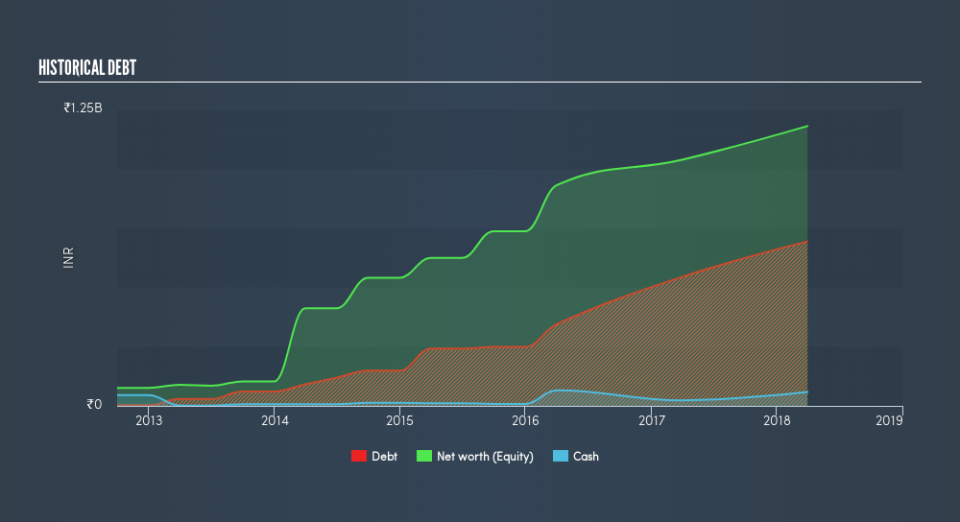What Does High Ground Enterprise Ltd.'s (NSE:HIGHGROUND) Balance Sheet Tell Us About It?

Want to participate in a short research study? Help shape the future of investing tools and you could win a $250 gift card!
High Ground Enterprise Ltd. (NSE:HIGHGROUND) is a small-cap stock with a market capitalization of ₹460m. While investors primarily focus on the growth potential and competitive landscape of the small-cap companies, they end up ignoring a key aspect, which could be the biggest threat to its existence: its financial health. Why is it important? Understanding the company's financial health becomes essential, since poor capital management may bring about bankruptcies, which occur at a higher rate for small-caps. Let's work through some financial health checks you may wish to consider if you're interested in this stock. Nevertheless, this is not a comprehensive overview, so I recommend you dig deeper yourself into HIGHGROUND here.
Does HIGHGROUND Produce Much Cash Relative To Its Debt?
HIGHGROUND's debt levels surged from ₹544m to ₹693m over the last 12 months , which is mainly comprised of near term debt. With this rise in debt, HIGHGROUND currently has ₹59m remaining in cash and short-term investments , ready to be used for running the business. Moreover, HIGHGROUND has produced cash from operations of ₹26m over the same time period, resulting in an operating cash to total debt ratio of 3.8%, meaning that HIGHGROUND’s debt is not covered by operating cash.
Can HIGHGROUND meet its short-term obligations with the cash in hand?
At the current liabilities level of ₹2.3b, the company has maintained a safe level of current assets to meet its obligations, with the current ratio last standing at 1.48x. The current ratio is calculated by dividing current assets by current liabilities. Generally, for Construction companies, this is a reasonable ratio as there's enough of a cash buffer without holding too much capital in low return investments.
Is HIGHGROUND’s debt level acceptable?
With debt reaching 59% of equity, HIGHGROUND may be thought of as relatively highly levered. This is somewhat unusual for small-caps companies, since lenders are often hesitant to provide attractive interest rates to less-established businesses. No matter how high the company’s debt, if it can easily cover the interest payments, it’s considered to be efficient with its use of excess leverage. A company generating earnings before interest and tax (EBIT) at least three times its net interest payments is considered financially sound. In HIGHGROUND's case, the ratio of 4.88x suggests that interest is appropriately covered, which means that lenders may be willing to lend out more funding as HIGHGROUND’s high interest coverage is seen as responsible and safe practice.
Next Steps:
Although HIGHGROUND’s debt level is towards the higher end of the spectrum, its cash flow coverage seems adequate to meet obligations which means its debt is being efficiently utilised. Since there is also no concerns around HIGHGROUND's liquidity needs, this may be its optimal capital structure for the time being. This is only a rough assessment of financial health, and I'm sure HIGHGROUND has company-specific issues impacting its capital structure decisions. You should continue to research High Ground Enterprise to get a better picture of the small-cap by looking at:
Historical Performance: What has HIGHGROUND's returns been like over the past? Go into more detail in the past track record analysis and take a look at the free visual representations of our analysis for more clarity.
Other High-Performing Stocks: Are there other stocks that provide better prospects with proven track records? Explore our free list of these great stocks here.
We aim to bring you long-term focused research analysis driven by fundamental data. Note that our analysis may not factor in the latest price-sensitive company announcements or qualitative material.
If you spot an error that warrants correction, please contact the editor at editorial-team@simplywallst.com. This article by Simply Wall St is general in nature. It does not constitute a recommendation to buy or sell any stock, and does not take account of your objectives, or your financial situation. Simply Wall St has no position in the stocks mentioned. Thank you for reading.

